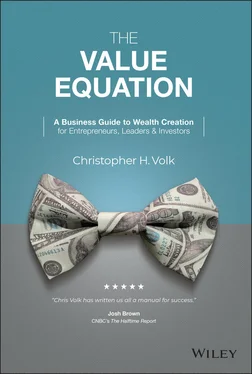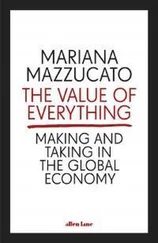When you are done reading this book, you should have more than just a basic understanding of how businesses create wealth. You can expect to have a good idea how companies are assembled and valued. And you will also gain insight into how business leaders work to improve corporate business models in ways that generate personal and collective wealth. These fundamentals rest at the heart of the creation of most of the largest personal fortunes ever assembled.
Businesses lie in the middle of the great river of global commerce. They are the engine of our global economy and are ultimately responsible for our collective prosperity. I have spent a career in the middle of the river and am happy to be able to share my observations with you. This book contains many illustrations of businesses, including STORE Capital, the most recent publicly traded company I co-founded.
The business case study illustrations within the book generally stop at 2019. The reasoning should be intuitive. The global pandemic that began in early 2020 created major global disruptions that resulted in near-term business performance and business model distortions. Given the timeless nature of the concepts in this book, this does not matter.
I have been fortunate to work in a time characterized by a high level of business formation and creativity, which has helped me and many others start large businesses from scratch. To my knowledge, business formation has never been more accessible. It is my hope that this book serves to inspire readers to harness the wealth creation potential of business as they contribute to, create, and run businesses that benefit us all.
Christopher Volk
Paradise Valley, Arizona
March 18, 2022
There are many ways to get rich. Strategies for personal wealth creation often center on personal habits that encourage controlled spending, the avoidance of debt, and the accumulation of investment assets designed to make your money work for you. But there is far less written about how businesses create wealth . I went through two years of graduate business school and emerged without taking a single class on the subject. Nor have I noticed any significant change in the understanding of business students in the intervening years since.
Corporate wealth creation stands at the center of our national economic prosperity. Most of us work for businesses. And it turns out, the richest among us did more than simply control spending, avoid debt, and accumulate investment assets. The very wealthiest Americans either made their money by owning a business or by inheriting money from family members who did. The investment assets they accumulated were centered in their own business endeavors.
Any discussion of business is incomplete without a discussion of wealth creation. The two go hand in hand, like peanut butter and jelly. Most growing business enterprises need independent investor capital, and a prerequisite for attracting investors is the company's potential for wealth creation. If a business is unlikely to be worth more than it cost to create—either now or in the near future—it is equally unlikely to attract the independent investor capital it needs.
And therein is the definition of business wealth creation: Making a business worth more than it cost to create .
To make something become worth more than it cost to create involves being an active investor. Investing in public stocks or bonds can deliver returns that can make you rich over time, but those returns are generally part of the fabric of overall corporate costs of capital. Businesses are supposed to reward you for making an investment in their stocks or bonds. Every now and again, investments in public stocks are rewarded with outsized returns as some of the business wealth created by leadership is sprinkled onto shareholders. Every now and again, investments in public stocks will be rewarded with outsized returns as investors pan for gold, seeking undervalued companies having solid, but misunderstood, business models. But corporate wealth creation tends to fall disproportionately on the corporate founders and early investors who took the risk. They are the first to be rewarded for making the company worth more than the cost of its parts.
Businesses have many stakeholders, including their investors. Those many stakeholders include owners, employees, creditors, suppliers, and communities. Today, one can be overwhelmed by the flood of published books and articles that debate which stakeholders are owed the highest degree of loyalty. To analyze the relative importance of stakeholder constituencies is easiest with established businesses, especially if they have grown to be large and powerful. But no large business I can think of got to be that way without first having created massive amounts of wealth for its founding owners. Without the strong potential for wealth creation, such companies would never have existed.
People who put their money into a start-up business typically have other investment choices. Those choices generally come with investment return expectations. In turn, such expectations effectively create a hurdle rate to attract investor capital to a new business. If you can meet or exceed that hurdle rate, then you have a chance to accomplish more than simply earning and saving money. You can create wealth from thin air by making your business worth more than it cost to put in place.
Here is a simple illustration: Since it was first created in 1926, investors in the S&P 500 stock index have earned, on average, 10% annually. That might make 10% the institutional investor benchmark hurdle rate, though I would note that I have generally seen more aggressive investor targets for newly minted companies. The hurdle rate, in this case 10%, is the starting point for wealth creation. Should your business produce a total investor rate of return of 10%, then your company will be simply worth what it cost to create. Raise that delivered return to 20% and your investment doubles in value. In business, it is the excess return , and not the appreciation of underlying business assets, which creates value from thin air. Likewise, a business can easily be worth less than what it cost to create. In this case, should your company's total rate of return be a mere 5%, then your investment value would stand to fall in half.
People commonly confuse investment returns with wealth creation . They are not the same. Think of it: A company could provide its shareholders with a meaty annual rate of return of 10%, yet still have created no value above what it cost to create. In turn, if you accumulate enough investable assets capable of delivering 10% annual rates of return over time, you can personally become rich. But keep in mind that without the potential to deliver annual returns greater than 10%, the company in our example would likely never have been able to attract sophisticated outside investor capital. The independent investors would likely have elected to invest their money elsewhere, possibly into the S&P 500 Index, which is backed by a portfolio of the nation's largest seasoned companies having far greater investment liquidity and far less execution risk.
Most established businesses realize rates of return that are not attractive for outside investors and yet still allow their owners to make a decent living and save some money. But wealth that is created out of thin air can only be achieved in business by producing annual rates of return above applicable return benchmarks. If you can achieve this, then you and your leadership team have realized an enormous accomplishment. If you can achieve this while also satisfying your many other stakeholders, then you can say you have attained a truly rare level of business success.
Shareholder wealth creation is the single most important corporate financial performance metric. It's not that hard to figure out. Just calculate what a company cost to create, then subtract what it owes to creditors, and you get a number equal to what owners have invested at cost. Now, compare that owner investment to its current valuation—this is obviously easiest with a public company—and you arrive at the amount of shareholder wealth creation. This number is called equity market value added , or EMVA, which is simply the amount by which a company's shareholder equity is worth more than it cost to create.
Читать дальше












